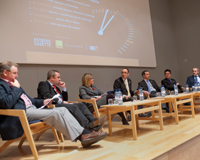Cambridge is a strong-performing region, but the brand must extend beyond the city centre if growth is to be sustained, according to the experts at the EG East of England Question Time
Chaired by Damian Wild, editor, Estates Gazette
What are the biggest challenges for property in Cambridge over the next decade?
Sven Töpel, chief executive, Brookgate: Securing planning consent. We have a masterplan to promote top-quality buildings in a highly sustainable location but it is taking a long time. The CB1 project, for example, has been going for seven or eight years and there is probably another six or seven years for it to go. That is really too long.
Emma Fletcher, property director, Marshall of Cambridge: Everybody wants to be in Cambridge, in the middle, by the station, but not everybody can be. South Cambs constricts the city. But it’s not only an authority issue, it’s also a telephone number issue. Everybody wants an 01223 number. People relocating their businesses want to be linked to Cambridge and, if they are moving internationally, people want to live in Cambridge. They want the schools, the benefits, they expect they are going to see King’s College Chapel from their house. The real issue is trying to spread the image of Cambridge.
What is Cambridge’s potential?
Nick Clarke, leader, Cambridgeshire county council: We need to expand the city in a way that is productive. We do lots of research and development in Cambridge, but most of the development actually disappears off to the US and to our European colleagues. Our new enterprise zone at Alconbury is a fantastic example of where development could quite rightly focus. We could build on the manufacturing strengths of Peterborough, slightly north of that.
Rob Sadler, director – commercial, Savills: The total revenue from the research sector in Cambridge accounts for 25%, which is massive. But our biggest threat is the Far East. We don’t compete against the tax breaks and incentives in those parts of the world. But what we have is the labour pool, and that comes from the connections with the university.
Why are so many new development schemes in and around Cambridge so bland?
Ben Coles, chief executive, Wrenbridge: We are in a tough market and we were probably developing buildings that were ultra-flexible and could be occupied by a number of different tenants. Therefore, they probably appear slightly more boring. But you don’t want to spend £180 per sq ft on a flashy fabulous building, because occupiers don’t want to pay more than they need to.
EF: The cost of applications is so high that there is a tendency to play it safe. You stick with architecture that has been proven before.
Should new offices be designed for a 100-year life, to assist the government’s carbon reduction targets for 2050?
NC: We have to challenge increasing carbon tax. If we genuinely believe climate change is man-made, then there are efficient ways of stopping that happening. But we are not doing that. In this city we want to self-flagellate by thinking that by turning off an extra light bulb we are going to save the planet. Fundamentally that is wrong. We should be building to mitigate whatever events the natural world brings along. We need to have buildings fit for purpose, as attractive as we can, within budget. They don’t have to be bland or about protecting the planet at some future date. That’s a false premise to be building on.
What can local and central government do to stimulate growth?
Charles Staveley, partner, Mills & Reeve: I am quite keen to look at local authority pensions and see whether they could be unlocked for investment into infrastructure, and getting some form of return back into the fund. That could start the cycle of growth.
NC: As local authorities, we have prudential borrowing abilities. The science park, Chesterton station, that was an obvious capital project to fund. It pays itself back in five to 10 years. Politicians can make some of those obvious decisions and provide much better civic leadership. We need to be telling the rest of the world that we are right alongside the developers and the entrepreneurs. I don’t think we have been very good at that.
EF: The average house price in Cambridge is £325,000. We have a real issue in the next 10 years of where all our staff are going to be living and working. We have got to look beyond South Cambs and start thinking about bringing people in, not just to Alconbury but up into East Cambs and over at Forest Heath. There needs to be investment in schools to influence where people live and then infrastructure on top of that. There is a perfectly good Harwich international train that runs from Cambridge to Ipswich and on to Harwich. You could put a park-and-ride in at Six-Mile Bottom, take all the traffic from the people that are flooding in from Suffolk and Norfolk and shuttle them in and out at Cambridge.
BC: We need central government initiatives like the Regional Growth Fund and the Growing Places schemes to kick-start opportunities. Local authorities need to put their covenant against projects. Also, if there is some rubbish green belt that could be housing or commercial, release it. That could be released through a sensible, logical approach to planning.











